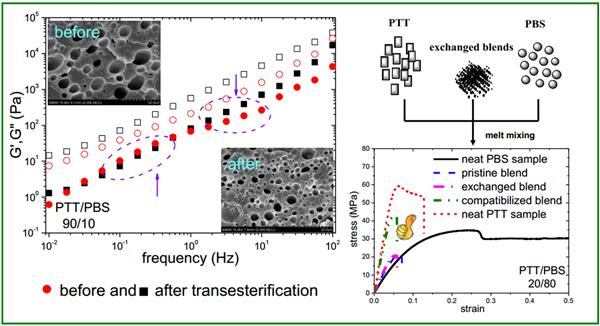Poly(trimethylene terephthalate)/Poly(butylenes succinate) Blend: Phase Behavior and Mechanical Property Control Using Its Transesterification System as the Compatibilizer
作者:Jianxiang Chen, Defeng Wu
关键字:polymers; mechanical testing; microstructure; mechanical properties.
论文来源:期刊
具体来源:Materials Chemistry & Physics
发表时间:2014年
Materials Chemistry & Physics 2014, 148(3), 554-561

ABSTRACT:
Poly(trimethylene terephthalate)/poly(butylenes succinate) (PTT/PBS) blends and their ester-exchanged system were prepared by melt mixing for the phase behavior and the viscoelasticity studies. A typical two-phase structure can be seen on the blends because two polymers are immiscible thermodynamically. The phase inversion behavior of the blends can be well determined by the blending ratio dependence of their dynamic rheological responses, which can also be predicted by the viscous Utracki model based on the viscosity ratio. However, the dynamic viscoelastic responses of the blends cannot be well described by the emulsion model because two polymers are highly asymmetric in their viscoelasticity. Besides, transesterification is an effective approach of reducing interfacial tension and improving final phase morphology of the blends, which can be evaluated qualitatively from viscoelastic response alterations after ester exchange reaction. The mechanical properties of PTT/PBS blends were also studied. The results reveal that the ester-exchanged blends show mechanical strengths even lower than the pristine ones because of bulk degradation accompanied with transesterification, despite their improved phase structure. However, they can be used as the good compatibilizer to
improve phase adhesion of the pristine blends, enhancing strengths of the PTT based blends or toughness of the PBS based blends evidently.
PDF DOWNLOAD:
http://www.sciencedirect.com/science/article/pii/S0254058414005057